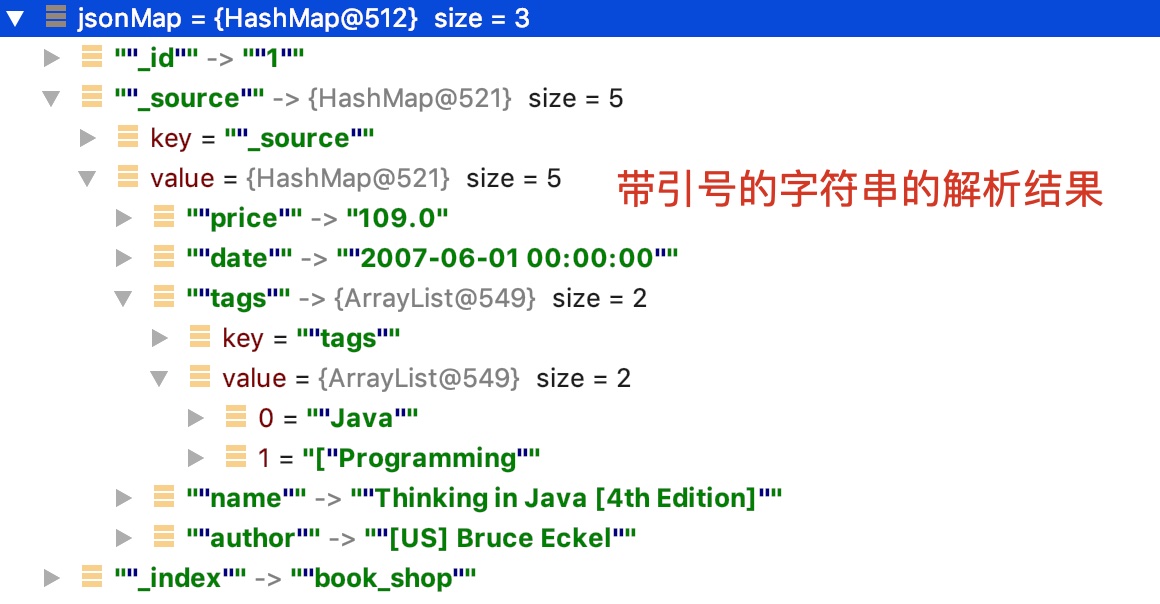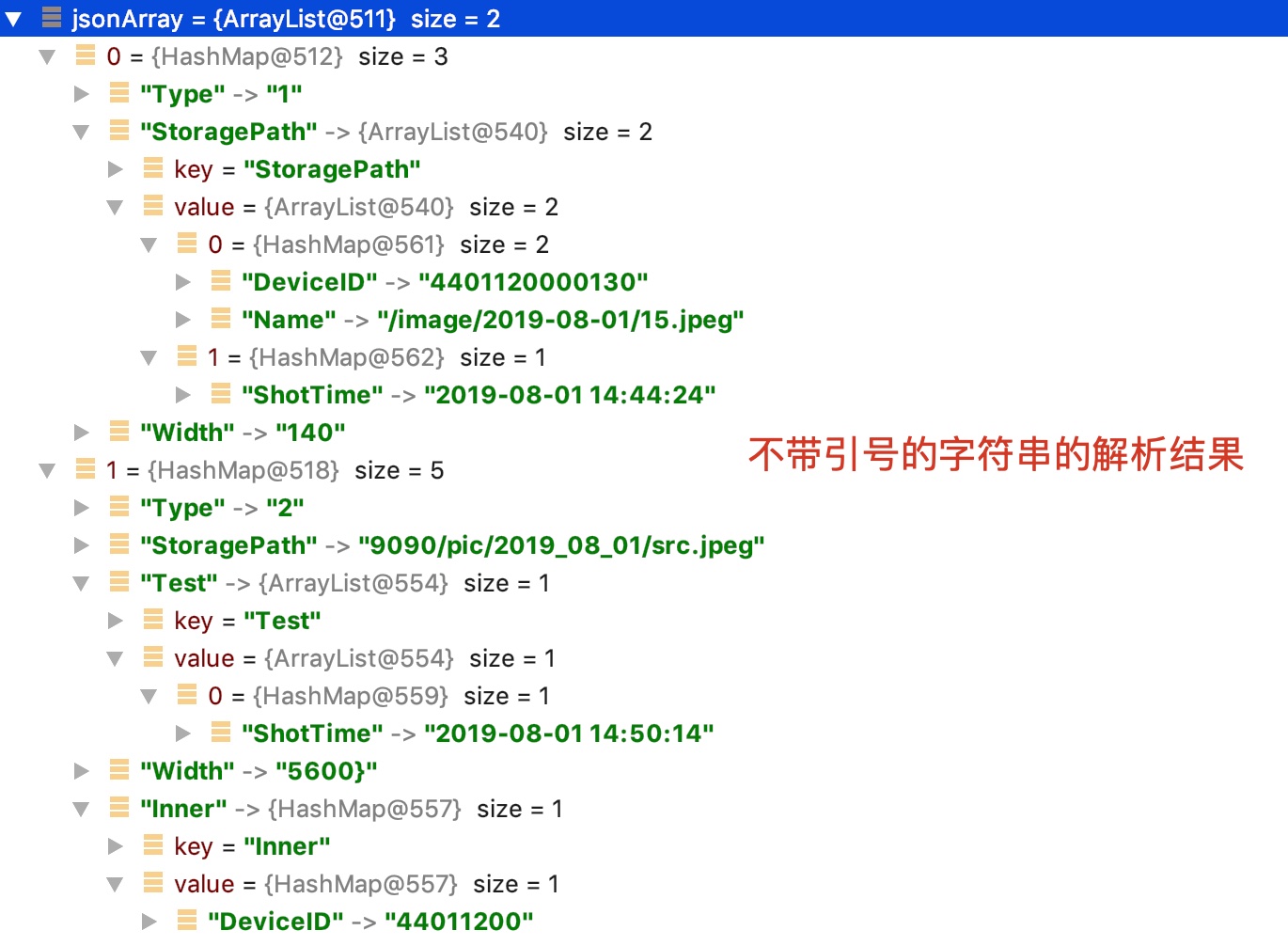Catalog
1 Requirement Description
A batch of JSON-like strings without quotation marks were encountered in the project:
{Name:Heal,Age:20,Tag:[Coding,Reading]}It needs to be parsed into JSON objects and then inserted into Elastic search to be stored as objects of type Object.
After comparing FastJson of Ali with Gson of Google, I couldn't find the function I wanted (maybe the blogger was not careful enough and had a message about children's learning to tell me about it). So I wrote a tool class to fulfill this requirement.
If it is a standard JSON string with quotation marks, it can be parsed directly through the above two tools. The method of use can be referred to:
Java - Two ways to format output JSON strings
2 parse code
2.1 Implementation Ideas
The main ideas of the code are explained in the annotations. The main ideas are as follows:
(1) Stack is used to count the [], {} symbols at the beginning and end of the string -- [] for List and {} for Map.
(2) Use String subString () method to reduce the parsed string;
(3) The internal List and Map objects are parsed recursively.
(4) For ease of processing, the smallest key-value is resolved to String type.
It should be noted that there should be no meaningless {,}, [,] symbols inside the string to be parsed, otherwise the parsing will be abnormal.
—— I haven't thought of a good compatibility method for the time being. If you have any ideas about pediatrics, please leave a message directly. **
2.2 Detailed Code
package com.healchow.util;
import java.security.InvalidParameterException;
import java.util.ArrayList;
import java.util.HashMap;
import java.util.List;
import java.util.Map;
import java.util.Stack;
/**
* Java Parsing Unquoted JSON Strings
*
* @author Heal Chow
* @date 2019/08/13 11:36
*/
public class ParseJsonStrUtils {
public static void main(String[] args) {
// Quoted strings treat strings as part of key-value, so such strings are recommended to be converted using tools such as fastJson, Gson, and so on.
// Note: There should be no meaningless {,}, [,] symbols inside String - no good compatibility method for the time being.
/*String sourceStr = "{\"_index\":\"book_shop\"," +
"\"_id\":\"1\"," +
"\"_source\":{" +
"\"name\":\"Thinking in Java [4th Edition]\"," +
"\"author\":\"[US] Bruce Eckel\"," +
"\"price\":109.0,\"date\":\"2007-06-01 00:00:00\"," +
"\"tags\":[\"Java\",[\"Programming\"]" +
"}}";*/
// Unquoted strings, the beginning and end of many pairs of [], {} do not affect parsing
String sourceStr = "[[[{" +
"{" +
"Type:1," +
"StoragePath:[{Name:/image/2019-08-01/15.jpeg,DeviceID:4401120000130},{ShotTime:2019-08-01 14:44:24}]," +
"Width:140" +
"}," +
"{" +
"Type:2,StoragePath:9090/pic/2019_08_01/src.jpeg," +
"Inner:{DeviceID:44011200}," +
"Test:[{ShotTime:2019-08-01 14:50:14}]," +
"Width:5600}" +
"}}]]]";
List<Map<String, Object>> jsonArray;
Map<String, Object> jsonMap;
Object obj = null;
try {
obj = parseJson(sourceStr);
} catch (Exception e) {
System.out.println("Error: " + e.getMessage());
e.printStackTrace();
}
if (obj instanceof List) {
jsonArray = (List<Map<String, Object>>) obj;
System.out.println("Parsing generates List object: " + jsonArray);
} else if (obj instanceof Map) {
jsonMap = (Map<String, Object>) obj;
System.out.println("Parsing generates Map object: " + jsonMap);
} else {
System.out.println("Strings that need to be parsed are neither JSON Array, And it doesn't fit. JSON Object!\n Original string: " + sourceStr);
}
}
/**
* Resolve Json-formatted strings, encapsulate them as List or Map, and return them
* Note: (1) key and value cannot contain ",", key cannot contain ":" - separated by "," "and":", respectively.
* (2) The string to be parsed must conform to the JSON object format, and only the outermost multi-layer nesting is handled simply.
* Complex examples such as {a:b},{x:y} will not be fully recognized - the correct ones should be [{a:b},{x:y}].
* @param sourceStr A string surrounded by "[]" or "{}"
* @return Generated JsonObject
*/
public static Object parseJson(String sourceStr) throws InvalidParameterException {
if (sourceStr == null || "".equals(sourceStr)) {
return sourceStr;
}
// Determine whether there are redundant matching "[]" and "{}" at the beginning and end of a string
String parsedStr = simplifyStr(sourceStr, "[", "]");
parsedStr = simplifyStr(parsedStr, "{", "}");
// Implementing the entry and exit of "[]" and "{}" with the help of stack
Stack<String> leftSymbolStack = new Stack<>();
Stack<String> rightSymbolStack = new Stack<>();
if ((parsedStr.startsWith("[") && parsedStr.endsWith("]")) || (parsedStr.startsWith("{") && parsedStr.endsWith("}"))) {
leftSymbolStack.push(parsedStr.substring(0, 1));
rightSymbolStack.push(parsedStr.substring(parsedStr.length() - 1));
parsedStr = parsedStr.substring(1, parsedStr.length() - 1);
// The interior of parsedStr may also be a continuous'{}}'
parsedStr = simplifyStr(parsedStr, "{", "}");
} else {
throw new InvalidParameterException("There is a mismatch in the string to parse'[]'or'{}', Please check!\n The original string is: " + sourceStr);
}
// Save the result of parsing. jsonArray may contain only String, or Map < String, Object >
List<Object> jsonArray = new ArrayList<>();
Map<String, Object> jsonMap = new HashMap<>(16);
// Internal traversal and analysis
innerParseByLoop(parsedStr, leftSymbolStack, rightSymbolStack, jsonArray, jsonMap);
// Judging whether JSON Array is empty
if (jsonArray.size() > 0) {
return jsonArray;
} else {
return jsonMap;
}
}
/**
* Loop parsing internal List and Map objects
*/
private static void innerParseByLoop(String parsedStr, Stack<String> leftSymbolStack, Stack<String> rightSymbolStack,
List<Object> jsonArray, Map<String, Object> jsonMap) throws InvalidParameterException {
if (parsedStr == null || parsedStr.equals("")) {
return;
}
// Separate according to "."
String[] allKeyValues = parsedStr.split(",");
if (allKeyValues.length > 0) {
// Traverse and parse separately according to ":"
out:
for (String keyValue : allKeyValues) {
// If the keyValue contains ":", indicating that the keyValue is an object in List < Map>, it is necessary to determine the location of the first ":" - there may be multiple ":".
int index = keyValue.indexOf(":");
if (index > 0) {
// Determine whether the key still starts with "{" or "[", and if so, the stack
String key = keyValue.substring(0, index);
while (key.startsWith("[") || key.startsWith("{")) {
leftSymbolStack.push(key.substring(0, 1));
// The parsed string should be followed up all the time.
parsedStr = parsedStr.substring(1);
key = key.substring(1);
}
// Whether Interpretation and value Start with "[" - Another List Object - Recursive Resolution
String value = keyValue.substring(index + 1);
if (value.startsWith("[")) {
int innerIndex = parsedStr.indexOf("]");
List<Object> innerList = (List<Object>) parseJson(parsedStr.substring(key.length() + 1, innerIndex + 1));
jsonMap.put(key, innerList);
// Clear the last "]" and determine if it exists.
parsedStr = parsedStr.substring(innerIndex + 1);
if (parsedStr.indexOf(",") == 0) {
parsedStr = parsedStr.substring(1);
}
// This internal object, the internal "," has been parsed, to correct according to "," the cut string array, and continue to traverse.
innerParseByLoop(parsedStr, leftSymbolStack, rightSymbolStack, jsonArray, jsonMap);
break;
}
// Whether Interpretation and value Begin with'{''-- Another Map Object -- Recursive Resolution
else if (value.startsWith("{")) {
int innerIndex = parsedStr.indexOf("}");
Map<String, Object> innerMap = (Map<String, Object>) parseJson(parsedStr.substring(key.length() + 1, innerIndex + 1));
jsonMap.put(key, innerMap);
// Clear the last "}" and determine if it exists.
parsedStr = parsedStr.substring(innerIndex + 1);
if (parsedStr.indexOf(",") == 0) {
parsedStr = parsedStr.substring(1);
}
// This internal object, the internal "," has been parsed, to correct according to "," the cut string array, and continue to traverse.
innerParseByLoop(parsedStr, leftSymbolStack, rightSymbolStack, jsonArray, jsonMap);
break;
}
// Finally, determine whether the value tail contains "]" or "}"
else {
while (value.endsWith("]") || value.endsWith("}")) {
// The rightmost character
String right = value.substring(value.length() - 1);
// At this point, the top element of the stack
String top = leftSymbolStack.peek();
// If there is a match, then stack, otherwise ignore
if (("}".equals(right) && "{".equals(top)) || ("]".equals(right) && "[".equals(top))) {
leftSymbolStack.pop();
value = value.substring(0, value.length() - 1);
jsonMap.put(key, value);
// Clear the last "}" and determine if it exists.
parsedStr = parsedStr.substring(key.length() + 1 + value.length() + 1);
if (parsedStr.indexOf(",") == 0) {
parsedStr = parsedStr.substring(1);
}
// When an object is parsed, the element is added to the List and a new object is created.
jsonArray.add(jsonMap);
jsonMap = new HashMap<>(16);
// Continue with the analysis of the outer layer
continue out;
}
// If they do not match, they may be the last symbol of the source string
else {
rightSymbolStack.push(right);
value = value.substring(0, value.length() - 1);
}
}
jsonMap.put(key, value);
int length = key.length() + value.length() + 2;
if (parsedStr.length() > length) {
parsedStr = parsedStr.substring(length);
} else {
parsedStr = "";
}
}
}
// If the keyValue does not contain ":", which means that the keyValue is only a string in List < String > but not a Map in List < Map >, it can be added directly to List.
else {
jsonArray.add(keyValue);
}
}
// The end of traversal and the final symbolic problem: judging whether the left stack matches the right stack or not
while (!leftSymbolStack.empty()) {
if (leftSymbolStack.peek().equals("{") && parsedStr.equals("}")) {
leftSymbolStack.pop();
}
if (!rightSymbolStack.empty()) {
if (leftSymbolStack.peek().equals("{") && rightSymbolStack.peek().equals("}")) {
leftSymbolStack.pop();
rightSymbolStack.pop();
} else if (leftSymbolStack.peek().equals("[") && rightSymbolStack.peek().equals("]")) {
leftSymbolStack.pop();
rightSymbolStack.pop();
} else {
throw new InvalidParameterException("The incoming string cannot be parsed JSON object!\n The original string is: " + parsedStr);
}
}
}
}
}
/**
* Simplify the string by judging whether there are redundant matching "[]" and "{}" at the beginning and end of the string
*/
private static String simplifyStr(String sourceStr, String firstSymbol, String lastSymbol) {
while (sourceStr.startsWith(firstSymbol) && sourceStr.endsWith(lastSymbol)) {
String second = sourceStr.substring(1, 2);
// If the second is still "[" or "{", then judge whether the penultimate is "]" or "}" - indicating that the length is at least 3, there will be no IndexOutOfBoundsException.
if (second.equals(firstSymbol)) {
String penultimate = sourceStr.substring(sourceStr.length() - 2, sourceStr.length() - 1);
if (penultimate.equals(lastSymbol)) {
// Shorten the string to parse
sourceStr = sourceStr.substring(1, sourceStr.length() - 1);
} else {
break;
}
} else {
break;
}
}
return sourceStr;
}
}2.3 Test Sample
(1) Quoted test:
// Test string:
String sourceStr = "{\"_index\":\"book_shop\"," +
"\"_id\":\"1\"," +
"\"_source\":{" +
"\"name\":\"Thinking in Java [4th Edition]\"," +
"\"author\":\"[US] Bruce Eckel\"," +
"\"price\":109.0,\"date\":\"2007-06-01 00:00:00\"," +
"\"tags\":[\"Java\",[\"Programming\"]" +
"}}";The analytical results are as follows:
(2) Test without quotation marks:
// Test string:
String sourceStr = "[[[{" +
"{" +
"Type:1," +
"StoragePath:[{Name:/image/2019-08-01/15.jpeg,DeviceID:4401120000130},{ShotTime:2019-08-01 14:44:24}]," +
"Width:140" +
"}," +
"{" +
"Type:2,StoragePath:9090/pic/2019_08_01/src.jpeg," +
"Inner:{DeviceID:44011200}," +
"Test:[{ShotTime:2019-08-01 14:50:14}]," +
"Width:5600}" +
"}}]]]";The analytical results are as follows:

Copyright Statement
Authors: Thin Wind (https://healchow.com)
Origin: Blog Garden Thin Wind Blog (https://www.cnblogs.com/shoufeng)
Thank you for reading. If the article helps or inspires you, click[ Good writing should go to the top (vii) ] Or[ Recommendations (1) ] Let's go.
Copyright of this article belongs to the blogger. Reprint is welcome, but [link of the original text must be marked clearly on the article page]. Otherwise, the blogger reserves the right to pursue the legal responsibility of the relevant personnel.